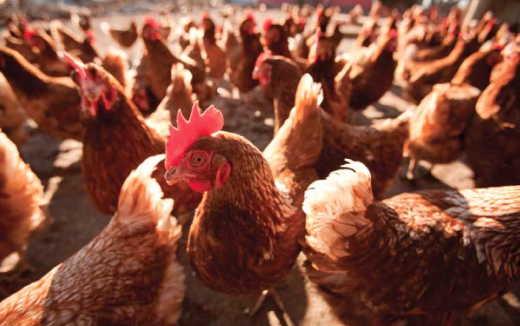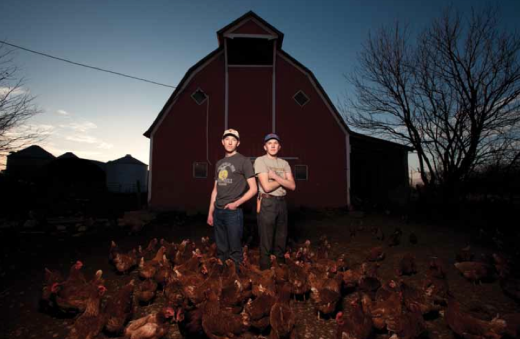Free Range

Jumping in ahead of the craze, Dustin and Austin Stanton have carved out their corner as the nation’s largest producer of free-range eggs
Driving to the Stanton Brothers Farm, little broods of hens collect at the sides of the roads, around Dustin Stanton’s black ‘96 mustang and the family’s mailbox. Whenever brothers Dustin and Austin come outside, the hens flock to them and peck right above their work boots in droves. But the chickens don’t discriminate, and they aren’t shy. Even a guest is subject to a thorough peck-down, though Austin says, “You eventually go numb to it.”
According to the USDA, Stanton Brothers Farm is the largest free-range egg farm in the United States; it produces more than 2.5 million eggs each year. A free-range farm allows the chickens to spend time outside.
“The reason we chose [free-range] is that it’s a niche market, and we really enjoy knowing who we’re selling to,” Dustin says. It also lifts some of the initial financial burdens of starting a business.
Although the USDA doesn’t require a certain amount of time outdoors or a specific diet, the Stanton brothers’ chickens live off grain and grass and roam freely at all hours. “You can mark a chicken and find it in the same building every single night,” Austin says. “They know where their home is.”
The national craze for organic foods and healthful farming conditions has also helped Stanton Brothers in recent years. “I don’t know how we did it, but we hit the market just right back in 2007 because that’s when the demand for free-range eggs was really starting to pick up and escalate into what it is now,” Dustin says. And it looks like it will continue to increase for the next few years, he adds.
“People want to know where their food came from,” Dustin says. “They want to know the farmer. And when people pick up our eggs, they get to talk to us and see our faces. They don’t just see a dozen eggs.”

It began with six baby chicks
The entire 12,000-hen affair began with six baby chicks when Dustin was 6 years old. His first-grade class at Centralia Elementary School was tasked with taking care of a handful of baby chicks with the local 4H chapter. At the end of the school year, one lucky student would get to take the chicks home. Dustin wanted to be that first-grader. He put his name in the drawing and was the only one interested until at the last minute, a classmate added her name and won.
“I came home, and I was devastated,” Dustin says. “I told my uncle about it, and the next day he had bought me some chicks.” Dustin began collecting his allowance off the eggs, but as he got older, those six chicks grew from an allowance into a job and, now, a career. When his younger brother, Austin, reached first grade, he, too, started in the business. The brothers’ parents, Andrew and Judy, self-employed crop and cattle farmers, also help with the business.
By 2007, the business was about to undergo the unexpected. Dustin heard the Columbia Farmers Market was short on eggs, so he loaded up his refrigerated truck (or was it just the Durango at this time?) and headed to town with high hopes and low prices. Yet, due to wet weather, only one person stopped by his booth to buy half a dozen eggs. “But we went the next week and sold a whole dozen,” he says. “That’s a 100 percent increase in business.”
The business has continued to double in profit annually. The family now delivers to more than 40 vendors per week. Many of their eggs show up in stores such as Hy-Vee, Prenger’s, Patricia’s, Clover’s Natural Market and Natural Grocers. Still more are delivered to the dining halls of Columbia College and the University of Missouri and the buffet at the Isle of Capri in Boonville.
“We’re at the point now where we’ve reached an economy of scale and have become large enough to lower prices some more,” Dustin says. This past winter, Stanton Brothers eggs were often cheaper than Walmart eggs, which cost $1.88 per dozen. However, the average number of eggs per hen per year for the Stantons is 200, and the national average, according to the U.S. Poultry and Egg Association, is 259. “That’s the cost of free-range. The production levels aren’t as efficient.”
Currently, all the work — from gathering to processing — is completely by hand on the Stanton farm, the way farmers did it in the early 20th century when selling eggs first became profitable. “For one person just to gather eggs right now, it’s a full-time job of eight hours a day,” Dustin says.
“Chickens don’t really take breaks,” he adds. “They don’t really know what Christmas or Saturdays are.” The Stantons do everything from growing the feed for the hens to collecting and packaging the eggs and taking them to market in their refrigerated truck.
But everything will soon change, as the Stantons are building a new facility equipped with automated feed and water lines and egg-gathering conveyor belts. “All we’ll have to do, fingers crossed, is press a button, and the egg will go on the belt through a hole in the wall where they’ll be washed, further processed and boxed,” Dustin says. The updated computerized system will increase egg production by keeping the chickens at the perfect warmth to lay all year round. Further, it will decrease feed costs and the need for labor.
Find the demand, and build the supply
Due to the Stantons’ success in the egg business, a handful of companies recently requested to buy out the Stanton farm. Declining all offers, the Stanton brothers wanted to keep their business and continue building it. “Most businesses build up a big supply, and then they find demand, but we’ve done that exactly in reverse,” Dustin says, explaining how they’ve managed to be so successful. “We find the demand, and then we build supply.” To do that, everyone in the family has to embrace several responsibilities, including being savvy investors.
“We buy a flock of birds, and we get it back through the birds,” Dustin says. “So it’s grown through business sense and common sense.”
The Stanton brothers have received national recognition for their business. Not only did Dustin win an international award and a trip to Costa Rica through the FFA, but he was also invited to speak to congress. Dustin says part of the recognition is the brothers’ sheer level of success, but he says it also has a lot to do with their age. “Not many 20-year-olds and teenagers are running a business like this,” he says.
Dustin is now a junior on scholarship at MU and studying agriculture management, and Austin is completing his sophomore year at Centralia High School. Dustin says that though most people put college first at this age, his top priority is making his business more efficient.
As for the girl who beat out Dustin for those first baby chicks? “We joke about it now because she didn’t end up liking them that much,” he says. “I think her parents took care of them for a while and then gave them away.”


